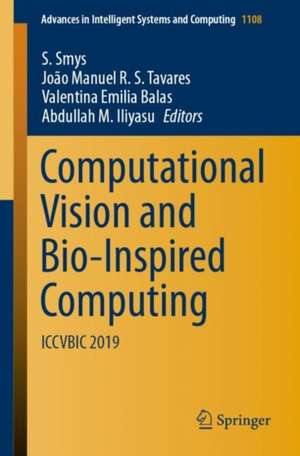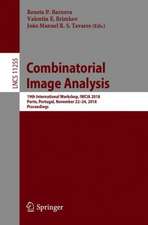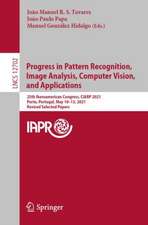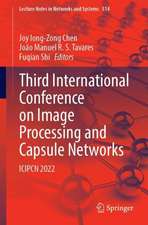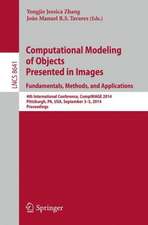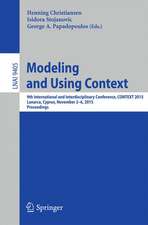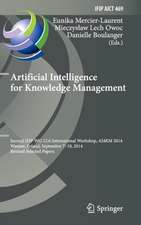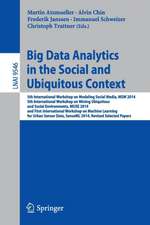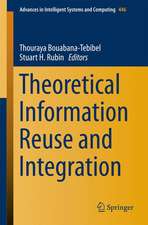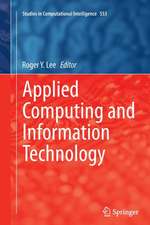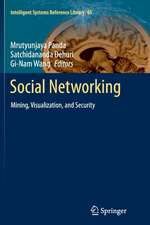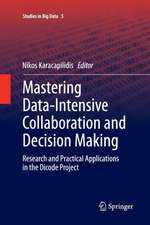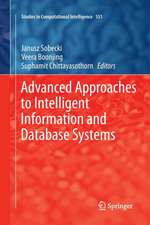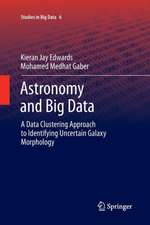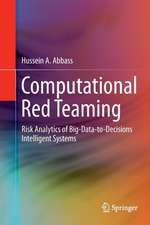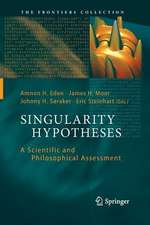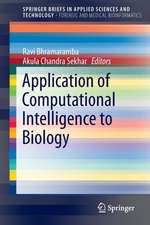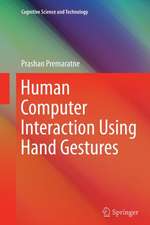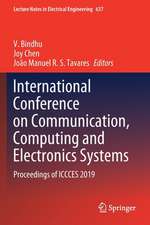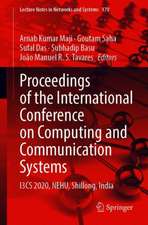Computational Vision and Bio-Inspired Computing: ICCVBIC 2019: Advances in Intelligent Systems and Computing, cartea 1108
Editat de S. Smys, João Manuel R. S. Tavares, Valentina Emilia Balas, Abdullah M. Iliyasuen Limba Engleză Paperback – 8 ian 2020
The book reveals the theoretical and practical aspects of bio-inspired computing techniques, like machine learning, sensor-based models, evolutionary optimization, and big data modeling and management, that make use of effectual computing processes in the bio-inspired systems. As such it contributes to the novel research that focuses on developing bio-inspired computing solutions for various domains, such as human–computer interaction, image processing, sensor-based single processing, recommender systems, and facial recognition, which play an indispensable part in smart agriculture, smart city, biomedical and business intelligence applications.
Din seria Advances in Intelligent Systems and Computing
- 20%
 Preț: 1120.87 lei
Preț: 1120.87 lei - 20%
 Preț: 1090.59 lei
Preț: 1090.59 lei - 20%
 Preț: 1324.07 lei
Preț: 1324.07 lei - 20%
 Preț: 1989.79 lei
Preț: 1989.79 lei - 18%
 Preț: 1273.28 lei
Preț: 1273.28 lei - 20%
 Preț: 2264.51 lei
Preț: 2264.51 lei - 20%
 Preț: 1337.27 lei
Preț: 1337.27 lei - 20%
 Preț: 1297.67 lei
Preț: 1297.67 lei - 20%
 Preț: 1315.82 lei
Preț: 1315.82 lei - 20%
 Preț: 1310.88 lei
Preț: 1310.88 lei - 20%
 Preț: 1302.62 lei
Preț: 1302.62 lei - 20%
 Preț: 882.19 lei
Preț: 882.19 lei - 20%
 Preț: 1305.93 lei
Preț: 1305.93 lei - 20%
 Preț: 1629.32 lei
Preț: 1629.32 lei - 20%
 Preț: 1345.49 lei
Preț: 1345.49 lei - 18%
 Preț: 1227.52 lei
Preț: 1227.52 lei - 18%
 Preț: 1290.64 lei
Preț: 1290.64 lei - 20%
 Preț: 1041.10 lei
Preț: 1041.10 lei - 20%
 Preț: 1034.52 lei
Preț: 1034.52 lei - 20%
 Preț: 1298.50 lei
Preț: 1298.50 lei - 20%
 Preț: 1330.67 lei
Preț: 1330.67 lei - 20%
 Preț: 1483.28 lei
Preț: 1483.28 lei - 20%
 Preț: 1971.64 lei
Preț: 1971.64 lei - 20%
 Preț: 1006.48 lei
Preț: 1006.48 lei - 20%
 Preț: 1471.75 lei
Preț: 1471.75 lei - 20%
 Preț: 1471.56 lei
Preț: 1471.56 lei - 20%
 Preț: 1454.40 lei
Preț: 1454.40 lei - 20%
 Preț: 1494.84 lei
Preț: 1494.84 lei - 20%
 Preț: 1269.64 lei
Preț: 1269.64 lei - 20%
 Preț: 1481.64 lei
Preț: 1481.64 lei - 20%
 Preț: 1192.08 lei
Preț: 1192.08 lei - 20%
 Preț: 1298.50 lei
Preț: 1298.50 lei - 20%
 Preț: 1489.07 lei
Preț: 1489.07 lei - 20%
 Preț: 825.78 lei
Preț: 825.78 lei - 20%
 Preț: 1649.93 lei
Preț: 1649.93 lei - 20%
 Preț: 1463.49 lei
Preț: 1463.49 lei - 20%
 Preț: 1438.77 lei
Preț: 1438.77 lei - 20%
 Preț: 1474.22 lei
Preț: 1474.22 lei - 20%
 Preț: 1298.50 lei
Preț: 1298.50 lei - 20%
 Preț: 1327.35 lei
Preț: 1327.35 lei - 20%
 Preț: 1973.31 lei
Preț: 1973.31 lei - 18%
 Preț: 947.04 lei
Preț: 947.04 lei - 18%
 Preț: 1441.39 lei
Preț: 1441.39 lei - 20%
 Preț: 638.55 lei
Preț: 638.55 lei - 20%
 Preț: 1320.76 lei
Preț: 1320.76 lei - 20%
 Preț: 1948.56 lei
Preț: 1948.56 lei
Preț: 1946.92 lei
Preț vechi: 2433.65 lei
-20% Nou
Puncte Express: 2920
Preț estimativ în valută:
372.53€ • 388.96$ • 308.33£
372.53€ • 388.96$ • 308.33£
Carte disponibilă
Livrare economică 15-29 martie
Preluare comenzi: 021 569.72.76
Specificații
ISBN-13: 9783030372170
ISBN-10: 3030372170
Pagini: 1413
Ilustrații: XXV, 1413 p. 720 illus. In 2 volumes, not available separately.
Dimensiuni: 155 x 235 mm
Greutate: 1.77 kg
Ediția:1st ed. 2020
Editura: Springer International Publishing
Colecția Springer
Seria Advances in Intelligent Systems and Computing
Locul publicării:Cham, Switzerland
ISBN-10: 3030372170
Pagini: 1413
Ilustrații: XXV, 1413 p. 720 illus. In 2 volumes, not available separately.
Dimensiuni: 155 x 235 mm
Greutate: 1.77 kg
Ediția:1st ed. 2020
Editura: Springer International Publishing
Colecția Springer
Seria Advances in Intelligent Systems and Computing
Locul publicării:Cham, Switzerland
Cuprins
ToC will be updated soon.
Textul de pe ultima copertă
This proceedings book presents state-of-the-art research innovations in computational vision and bio-inspired techniques. Due to the rapid advances in the emerging information, communication and computing technologies, the Internet of Things, cloud and edge computing, and artificial intelligence play a significant role in the computational vision context. In recent years, computational vision has contributed to enhancing the methods of controlling the operations in biological systems, like ant colony optimization, neural networks, and immune systems. Moreover, the ability of computational vision to process a large number of data streams by implementing new computing paradigms has been demonstrated in numerous studies incorporating computational techniques in the emerging bio-inspired models.
The book reveals the theoretical and practical aspects of bio-inspired computing techniques, like machine learning, sensor-based models, evolutionary optimization, and big data modeling and management, that make use of effectual computing processes in the bio-inspired systems. As such it contributes to the novel research that focuses on developing bio-inspired computing solutions for various domains, such as human–computer interaction, image processing, sensor-based single processing, recommender systems, and facial recognition, which play an indispensable part in smart agriculture, smart city, biomedical and business intelligence applications.
The book reveals the theoretical and practical aspects of bio-inspired computing techniques, like machine learning, sensor-based models, evolutionary optimization, and big data modeling and management, that make use of effectual computing processes in the bio-inspired systems. As such it contributes to the novel research that focuses on developing bio-inspired computing solutions for various domains, such as human–computer interaction, image processing, sensor-based single processing, recommender systems, and facial recognition, which play an indispensable part in smart agriculture, smart city, biomedical and business intelligence applications.
Caracteristici
Presents innovations in bio-inspired computing applications Includes the proceedings of the International Conference on Computational Vision and Bio Inspired Computing, held in Coimbatore, India, on September 25–26, 2019 Describes new algorithms and research findings
